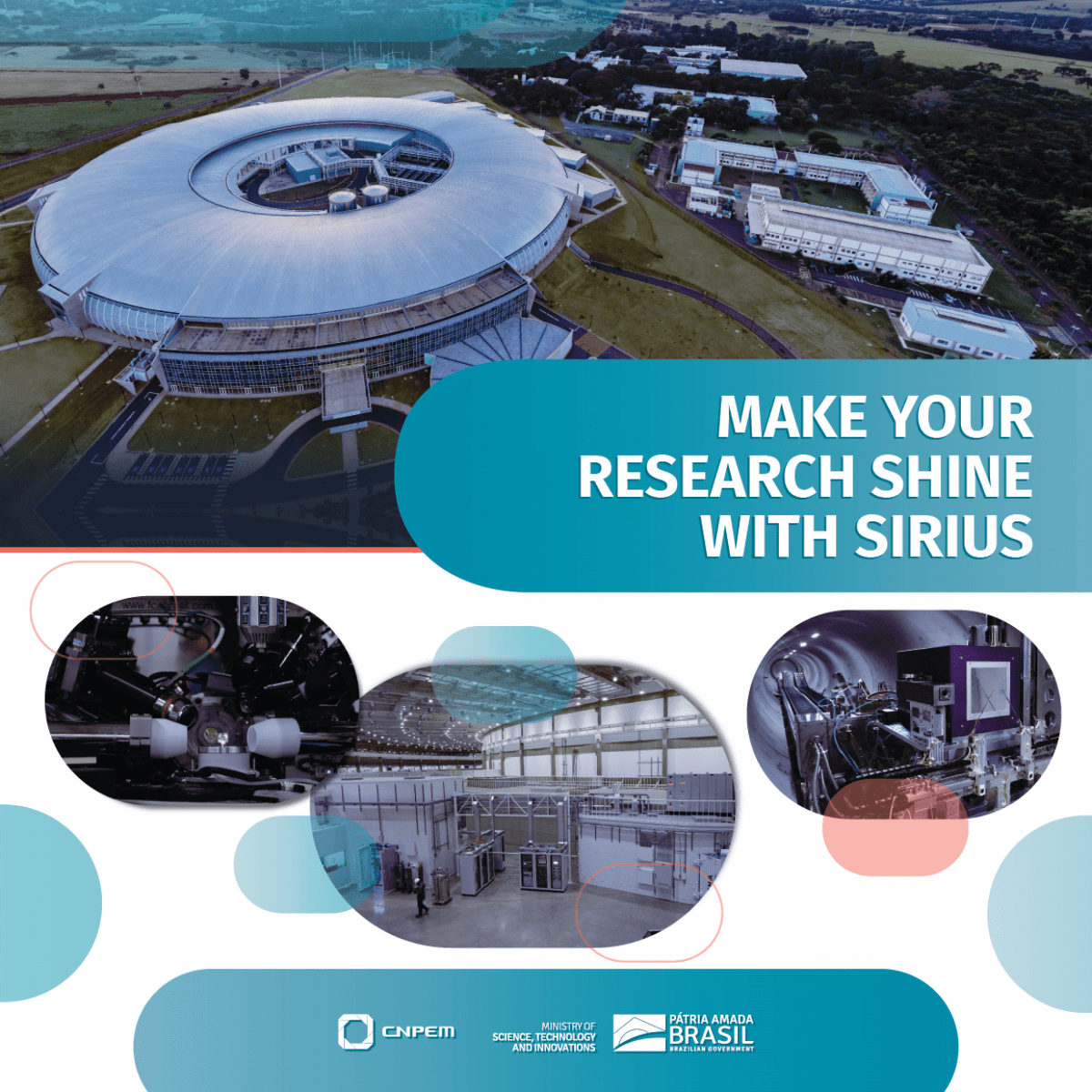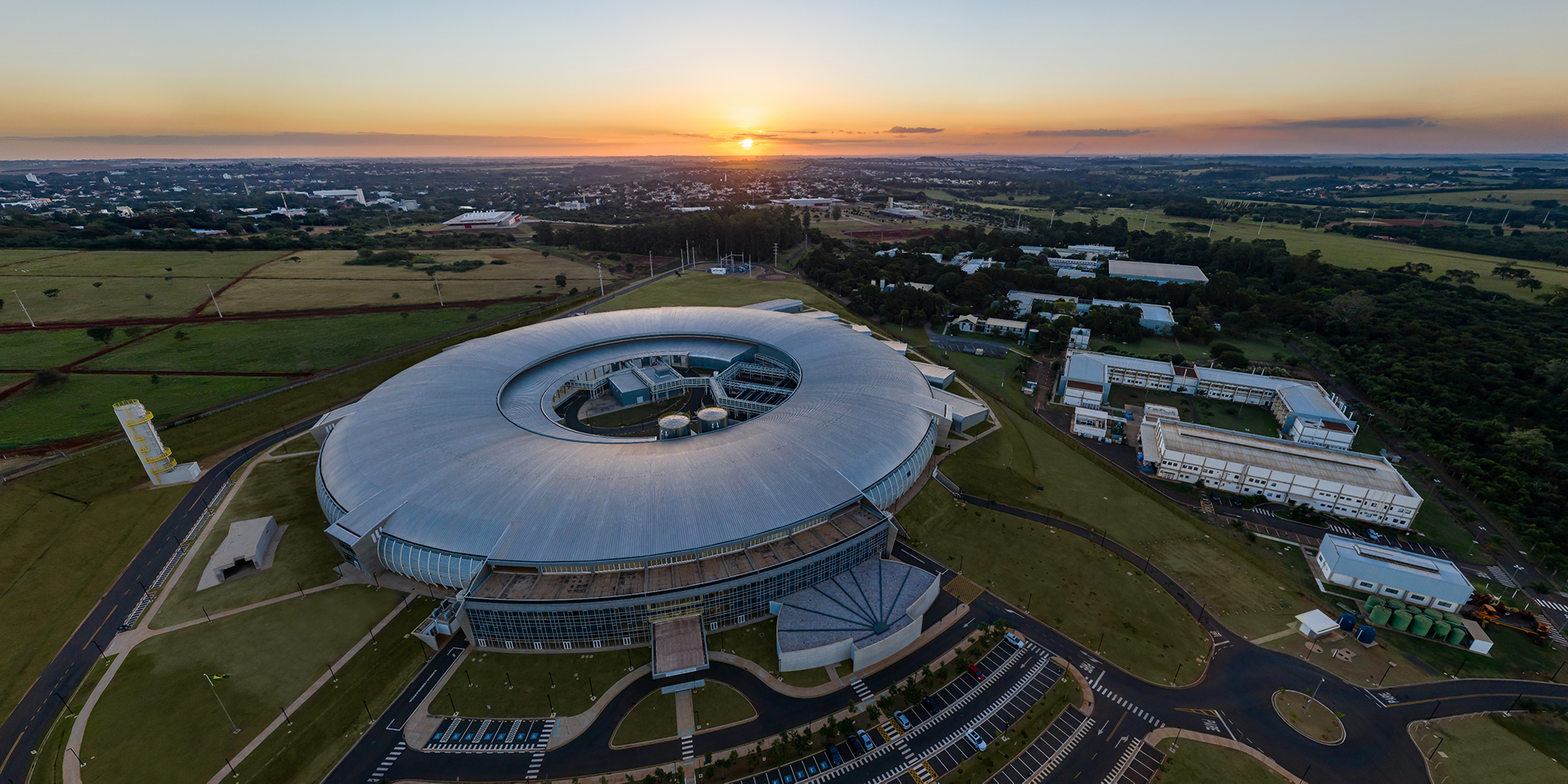
This call will adopt a new, more inclusive, collaborative review process. The submitted proposals will be evaluated on their scientific merit under a double-blind and crossed-peer review system
POSTPONED: New deadline for research proposal submissions is 19 December 2022, 12:00 (UTC/GMT-3).
Sirius, the Brazilian synchrotron light source, designed and operated by the Brazilian Center for Research in Energy and Materials (CNPEM), a private non-profit organization under the supervision of the Brazilian Ministry of Science, Technology, and Innovations (MCTI), opens a regular call for research proposals for six beamlines. From November 8 to December 15, those researchers interested in performing experiments at Sirius can submit a proposal.

Successful proposals will be selected by a review process that favors scientific merit through a distributed double anonymity peer-review system. The final allocation of beam time will also consider the geographic and scientific areas of proposers.
“Sirius was designed to leverage research in a wide range of scientific areas, and we encourage a broad diversity of novel research ideas. For this reason, we designed a more objective and impartial evaluation process in which every research proposal is analyzed from multiple points of view. We aim to receive scientific proposals targeting strategic problems, with well-designed scientific hypotheses that can be tested on Sirius, including the participation of research groups that are not experts in synchrotron science”, explains Harry Westfahl Jr., Director of CNPEM’s Brazilian Synchrotron Light Laboratory (LNLS), and coordinator of development and construction of the Sirius beamlines.
Besides access to synchrotron beamlines at no cost for academic use, researchers from Brazilian and foreign institutions residing in Latin American and Caribbean countries with approved proposals can also request financial assistance for travel and lodging to perform their experiments on Sirius. The projects awarded in this call will be scheduled to run during 2023, starting on March 1st. A new call for proposals is expected to open in the second quarter of 2023.
“The regular opening of the first Sirius beamlines to the scientific community is the most important milestone of the project, in my opinion. This call can benefit the most diverse areas, such as biology, geology, engineering, physics, and chemistry. For this, it is essential to defend the best conditions for science in the country. Our users need structure in their labs to ask questions, generate good hypotheses, perform the first tests, and then come to Sirius. It is essential that we have a very well-structured science and technology system and, above all, continuous investments in the training of human resources to reap good results in one of the most advanced equipment in the world”, says Antonio José Roque da Silva, Director-General of the CNPEM.
More information regarding the submission of proposals and financial assistance is available at Information For Users. Get in touch with the LNLS staff for further technical details at the contact form below.
Sirius’ first regular call for proposal includes six beamlines. These beamlines operate independently and simultaneously and have already passed the scientific commissioning phase when researchers tested the machine’s parameters and the available techniques in real-world experiments. The beamlines and the experiments available in this call are:
A new distributed review scheme will be adopted to evaluate each proposal from multiple points of view of different experts. All proposers will also be potential peer-reviewers for the same call within their areas of expertise. At least five reviewers will grade each proposal.
“Reviewers will not have access to the proponents’ names and their institutions of origin. Gender pronouns will also not appear in the research proposals. To ensure anonymity, authors must remove any language that identifies research previously published by their group to attenuate any bias from the reviewers”, emphasizes the LNLS director.
The analysis system also applies to research conducted by the CNPEM scientific teams.
Flow Chart of the LNLS Proposal Review Process
In addition to the six beamlines opening this cycle for regular operation, five more beamlines will receive users in scientific commissioning mode starting next year, where users can perform experiments that can help to evaluate the parameters of the beamline:
Additionally, the SAPÊ beamline (Angle-Resolved Photoemission Spectroscopy) will receive regular proposals for using the spectrometer offline, still without connection to the synchrotron source.
The scientific commissioning mode is open for submissions in a continuous flux, without any interruption. It is necessary to contact the beamline managers in advance to define the conditions of the experiments. For detailed beamline conditions, please consult the webpage.
About Sirius
Designed and built by Brazilians and funded by the Ministry of Science, Technology, and Innovation (MCTI), Sirius is one of the world’s most advanced synchrotron light sources. This facility has a state-of-the-art electron accelerator at its core, which generates a type of light that reveals the microstructure of organic and inorganic materials. These analyses are carried out at research stations called beamlines. Sirius will support several beamlines optimized for different experiments that will work independently, allowing several groups of researchers to work simultaneously on various research projects in diverse scientific areas, such as health, energy, new materials, and agricultural and environmental sciences.
The experimental techniques available at Sirius’ beamlines will make it possible to observe microscopic aspects of materials, such as the atoms and molecules that constitute them, their chemical states, and their spatial organization, in addition to following the evolution over time of physical, chemical and biological processes that occur in fractions of a second. In a beamline, it is also possible to observe how these microscopic characteristics are changed when the material is subjected to different conditions, such as high temperatures, mechanical stress, pressure, electric or magnetic fields, and corrosive environments. These capabilities are one of the main advantages of synchrotron light sources compared to other high-resolution experimental techniques.
Sirius’ beamlines are advanced scientific instruments designed to solve problems in strategic areas for development. Initially, a set of 14 beamlines were planned to cover various scientific programs. In total, Sirius will be able to house up to 38 beamlines.
About CNPEM
The Brazilian Center for Research in Energy and Materials (CNPEM), a private non-profit organization under the supervision of the Ministry of Science, Technology, and Innovations (MCTI), provides a sophisticated and vibrant environment for research and development that is unique in Brazil and is found in few scientific centers in the world. The Center operates four National Laboratories and is the birthplace of the most complex project in Brazilian science – Sirius – one of the world’s most advanced synchrotron light sources. CNPEM brings together highly specialized multi-thematic teams, globally competitive laboratory infrastructures open to the scientific community, strategic lines of investigation, innovative projects in partnership with the productive sector, and training of researchers and students. The Center is an environment driven by the search for solutions with impact in the areas of Health, Energy and Renewable Materials, Agriculture and Environment, and Quantum Technologies. Through the CNPEM 360 Platform, it is possible to explore, in a virtual and immersive way, the environment and activities of the Center; visit https://pages.cnpem.br/cnpem360/. As of 2022, with the support of the Ministry of Education (MEC), CNPEM expanded its activities with the opening of the Ilum School of Science. The interdisciplinary higher course in Science, Technology, and Innovation adopts innovative approaches to provide excellent, free, full-time training with immersion in the CNPEM research environment.
Contact form - Submit your doubt about the call for proposals
The event will take place from November 8th to 10th, in Campinas-SP, Brazil, in a hybrid format.
Registrations with abstract submissions are open until August 28th.